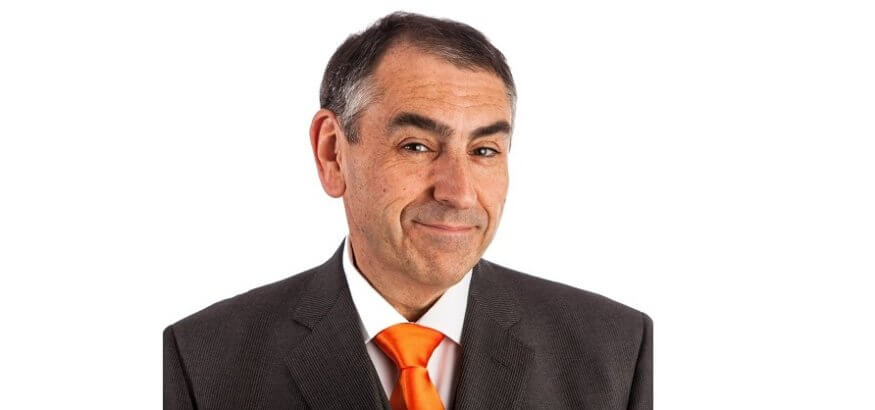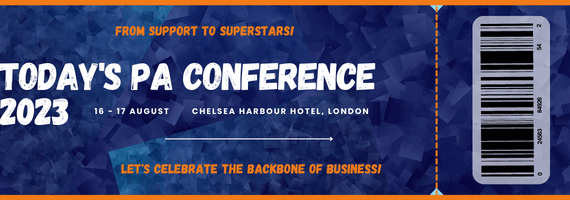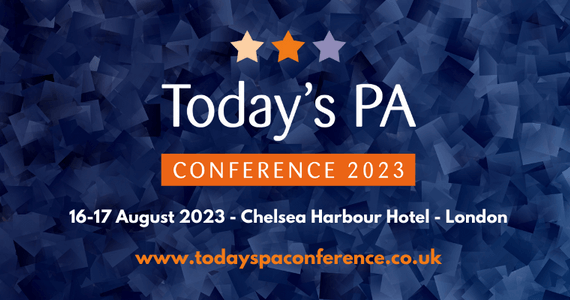Shopping cart
Your cart is empty
£0.00

John Hotowka is a name you may not have heard before – but we’re confident you’ll remember it! A motivational business speaker (and former professional magician), John draws on a combination of humour and magic to get his message across to his audience.
As a corporate magician, John spent 12 years working with the most high-profile companies in the world, informing and entertaining clients and their customers. A sudden crisis in confidence forced him to change not only his approach to work but also to his personal life. The result of this was ‘Achievement Thinking’.
John will be our first speaker at this year’s Today’s PA Conference on 17th August in London. He will be introducing us to his methodology, and showing us the ways in which these tools can transform our professional and personal lives. We spoke to John about how PAs can use these strategies and techniques to enhance the way we work, make sure we stay focused when under pressure, and handle the doubts and fears that can hold us back.
But first, we asked how he became a corporate magician.
“Magic was just my hobby, something I did on a part-time basis. I made a little bit of money from it, working in local restaurants, that sort of thing. But I originally qualified as an optician, and worked in that field for several years. Unfortunately, within seven years, I was made redundant three times. That really made me stop and think. By that point, I knew I didn’t want to work in optics anymore, it wasn’t for me. So I decided to try my luck at magic, just for a year to see how far it could take me. That was in June 1989. Twelve years later, I was working for nearly half the blue chip companies in the UK, travelling around Europe, speaking to executive boards, at conferences and product launches – sometimes 600 or 800 people – using magic on exhibition stands, and helping generate millions of pounds’ worth of business for my clients.
Then, in 2002, out of nowhere, I had a massive crisis of confidence. It all went downhill a bit. But like most things in life, when everything looks really rubbish, something good comes out of it – although you don’t see it like that at the time.”
“Yes, it’s basically the mindset needed to achieve, how we need to think in order to achieve our goals.
As a PA or EA, you may have two, three, or even four bosses, so you’re always juggling conflicting priorities. And it can feel as if it’s just you out there, dealing with everything. Even if you work on a one-to-one basis with your boss, there can be times when you feel completely on your own. It doesn’t have to be that way. The key is learning how to access the resources you need to give you the skills, knowledge, and confidence to achieve your goals.
For instance, we all have these limiting beliefs, that little voice that puts all these doubts into our head. “Am I good enough? Can I do this? Do I really have the talent?” Quite often, this limiting belief is an illusion we’ve created ourselves. We all have this belief that we’re not capable of doing certain things, and we all buy into that belief.
But limiting belief goes further than that. It prevents us asking for help when we need it. We start to think that by admitting we need help – for whatever reason – we’ll be seen as weak or not good enough. That’s totally untrue; it’s just our egos getting in the way. In reality, we usually have all the skills and the talents we need – or at the very least we know how or where to access them.”
“This is just a little example, something we can all relate to. Say we’re in a meeting, and there’s some discussion around a particular problem. We might think, “I should say something here,” but for whatever reason, we don’t. We keep quiet because we have this belief that we’re going to say something wrong, or hurt someone’s feelings, or whatever it may be. Then, later on, it turns out that we should have spoken up at the time because now something else has happened, it’s all escalated, and now we’re in a bit of a pickle.
The question is how, in the moment when we have that thought, can we make the right decision? With Achievement Thinking, there is a quick technique, just three very quick questions to help us decide whether we need to speak up or not. By following this process, we’ll know when to say to ourselves, “yes, speak up now”, or “no, back off and let it go”.
Achievement Thinking can also help keep our focus and our attention on what is helpful to us. PAs are under an enormous amount of pressure from all sides, solving everyone else’s problems, dealing with deadlines from maybe two or three bosses. In this situation, we tend to get stressed and frustrated, thinking, “who do they think I am? Some sort of miracle worker? They’ve not given me enough time, and it’s just me that’s got to do all this! Can I really do this in time? I’m under so much pressure at the moment. I’m so stressed!” And we start to focus solely on all those unhelpful thoughts.
But what we focus on is incredibly important. So we need to keep our attention on what is actually going to help us deal with the problem. Take an everyday example: imagine running for a bus, and at the last minute, just as we get there, it pulls away from the stop. We start to think, “I can’t believe it! Now I’m going to be late. I’m letting down so many people.” We focus on the problem, but that’s just wasting time. We need to stop, bring ourselves back, and think: “OK, the bus has gone – so what do we do?” At the conference, we’ll look at quick, simple ways to turn our focus away from the problem and start to think about how we can solve it.”
“I can certainly empathise with the ups and downs of running a business! When things started to go downhill in 2002, it was the usual thing. There were all those thoughts of “I’m not good enough, I can’t do this”. And I became afraid of taking on work. I was doing my marketing and arranging lots of meetings, but I wasn’t converting those into sales because I was afraid of letting down my clients. I thought I could only work in a certain way, that there were only certain conditions I could work in, because I knew that way I could guarantee success.
I needed to know what had gone wrong, why I was so successful one minute and struggling the next. I needed to learn how to put things right. I read all sorts of personal development books, studied NLP, and looked at how successful businesspeople dealt with the same sort of challenges. I took this research, combined it with my experience of working with all those the blue chip companies, and began developing a set of tools that I could apply to my life and my career.
And then, about seven years ago, someone said to me, “you’re a successful businessman; will you come and talk to our company?” I said, “I’m successful? What on earth do you mean? I keep banging my head against a brick wall, here. How am I a success?” He said, “You keep going.” Well, if you put it like that …
So, yes, understanding the challenges does help get the message across. And so does the humour. But the serious message is how resilience and the right mindset can get you places, and it’s important that the message isn’t diluted or trivialised in any way. Because of my background as an entertainer and magician, I can use magic to help punctuate the points. People will (hopefully) begin to have fun, and relax a little. When we’re relaxed, we’re more likely to learn – and to remember.
I use the Achievement Thinking toolset all the time, and it still helps me. I’m human; I still focus on the wrong things sometimes. I still make mistakes even though I know this stuff, even though I live and breathe this stuff! So I use these tools day in, day out, and they work each and every time. Not just for me, though. I get emails saying, “I heard you speak at a conference three years ago, and I’m still using the techniques you talked about. And they still work!”
We’ve all been to a lot of conferences and seen a lot of speakers. What’s interesting is that we can hear the same speaker give the same talk on three different occasions, and each time we’ll take away something different. Because at that particular moment in time, we focus on exactly what we need to hear.
This has happened to me twice. The first time, a woman and her sister came up to me. The woman said, “that was a great speech. What you said about such-and-such was so true. I will definitely do that.” I said, “I didn’t say that.” Her sister said, “no, he didn’t. But you needed to hear that!” I realised I should have kept quiet, not because I wanted to take the credit, but it would have added more credibility for her to go and do what she needed to do. So the second time it happened, I just said, “you go and do it.”
The truth is each time we speak at a conference, we don’t know who we’ll reach, we don’t know which part of our talk will resonate, or what the outcome of that will be. We don’t know who we’ll inspire.”
John will be our first speaker at the Today’s PA Conference on 17th August 2018, at the Chelsea Harbour Hotel, London SW10.



Tel.: +44 (0)20 7622 2400
Email: info@todayspa.co.uk
Today's PA
52 The Warwick Building
Chelsea Bridge Wharf
366 Queenstown Road
London
SW11 8NJ
Copyright © 2024 Today's PA. All rights Reserved.
We use cookies, just to track visits to our website, we store no personal details.
ACCEPT COOKIES What are cookies?